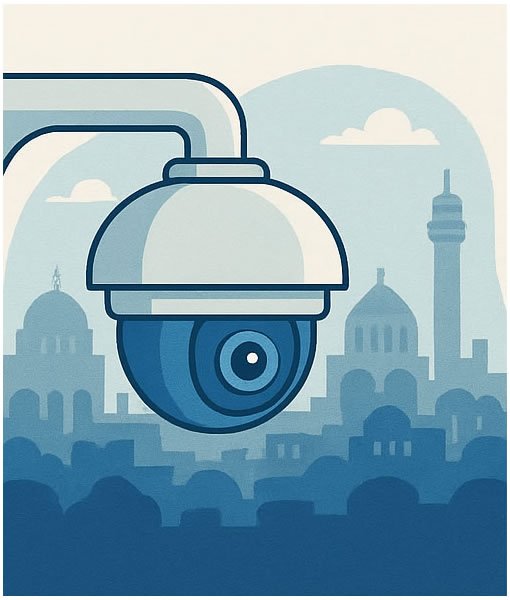Closed-circuit television (CCTV) systems have become a cornerstone of modern security infrastructure. In Jordan, however, the importation, installation, and use of surveillance cameras are tightly regulated to ensure public safety, protect privacy, and support national security interests. Whether you’re a business owner, importer, or simply looking to install a CCTV system at home, understanding the laws that govern surveillance technology in Jordan is crucial.
📌 Why CCTV Systems Are Regulated in Jordan
Surveillance cameras are recognized by the Jordanian government as powerful tools that contribute to crime prevention and public safety. They assist in identifying criminal activity, documenting events, and enhancing overall security in both private and public spaces.
However, misuse and unauthorized installations can lead to serious violations of privacy and potential security threats. As a result, the Jordanian Ministry of Interior—alongside key agencies such as the General Intelligence Directorate and Public Security Directorate—has implemented clear guidelines to manage their usage.
✅ Types of CCTV Cameras Allowed in Jordan
The Jordanian authorities allow the use and importation of certain types of cameras under strict guidelines:
- Visible Internal and External Fixed Cameras (CCTV)
Must not contain internal or external microphones (unless specified in exceptions). Cameras with a range of more than 50 meters require special approval. - PTZ (Pan-Tilt-Zoom) Cameras
Allowed for use only by official entities after clearance from the Ministry of Interior. Not allowed for personal use. - Indoor Mobile Cameras Without Optical Zoom
Permitted for residential use (homes, kindergartens) under a signed user commitment agreement. - In-Vehicle Surveillance Cameras
- Medical Cameras
Those that are part of a medical system are permitted. - Cameras in Artesian Wells and Water Sources
Permitted only for officially licensed institutions following Ministry of Interior approval. - Baby Monitors
Permissible with no microphone restrictions specified. - Cameras Attached to Mobile Gear (like smartphones)
Allowed as long as they are visible and meet other general conditions.
❌ Prohibited Surveillance Equipment
Certain devices are strictly prohibited from being imported or used in Jordan:
- Hidden or miniaturized cameras that can be easily concealed
- Cameras embedded in everyday objects (watches, pens, glasses, etc.)
- Mobile cameras used for hunting or unlawful recording
- Any camera that affects the privacy of individuals in sensitive locations (e.g., women’s salons, changing rooms, wedding halls)
🎤 Rules Regarding Microphones in CCTV Cameras
Jordan has issued specific regulations about audio recording:
- Built-in or External Microphones
Generally prohibited unless used in specific, approved environments such as:- Educational institutions (lecture halls, labs)
- Meeting rooms
- Residential intercom systems
- Banking services for the visually or hearing impaired
- Security Pledge Requirement
In all approved cases, the installer must sign a security pledge that limits the use of the audio feature strictly to its intended purpose. - Mandatory Signage
In areas with audio-enabled CCTV, clear signs must indicate that surveillance with microphones is active.
📍 Locations Where CCTV Use Is Prohibited
To preserve privacy and protect national security, the following areas are strictly off-limits for surveillance camera installation:
- Near or within military and official government buildings
- Women’s public swimming pools and private care areas
- Women’s changing rooms, wedding halls, and beauty clinics
- Any place where camera use would violate personal privacy
📑 Legal Obligations for CCTV Users and Importers
- Registration and Approval
All importers must comply with Ministry of Interior and Customs requirements. New models must be inspected and approved before distribution. - Access by Authorities
External camera users must grant authorities access to recorded footage upon request. - Standard Compliance
All cameras must meet Jordanian technical specifications and be registered under the Jordanian Standards and Metrology Organization. - Corrective Actions
Existing users must update their systems to comply with new laws within one month of any regulatory change.
⚖️ Penalties for Violations
Failure to comply with Jordan’s CCTV laws can result in:
- Confiscation of equipment
- Legal action under the Crime Prevention Law
- Sanctions imposed by the Ministry of Interior, Ministry of Industry, and Customs
- Suspension or revocation of import or installation licenses
📌 Conclusion
As the demand for security technology grows in Jordan, understanding and complying with the country’s surveillance laws is more important than ever. Whether you’re a business, a residential user, or a technology importer, staying aligned with the Ministry of Interior’s evolving regulations ensures that your surveillance solutions are both effective and legal.
If you’re planning to install a CCTV system in Amman or elsewhere in Jordan, consult a licensed security provider who understands the legal landscape. Compliance isn’t just about avoiding penalties—it’s about protecting the rights and safety of everyone.
Need professional CCTV consultation or installation in Amman?
Contact our certified experts today to ensure full compliance with Jordanian surveillance laws.

